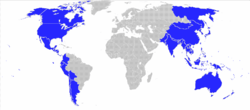Gamelan Council
Gamelan Council – Asia-Pacific Microfinance, Public Health & Development Centre |
||||
|---|---|---|---|---|
|
||||
 Countries where the Gamelan Council largely works shown in blue
|
||||
| Headquarters | Sydney, Australia | |||
| Type | Non-profit, non-governmental organization | |||
| Key jurisdictions addressed | 73 | |||
| Leaders | ||||
| - | Director | C. Scott López-Gelormino | ||
| Establishment | 2005 | |||
| Website http://www.gamelancouncil.org/ |
||||
The Gamelan Council – Asia-Pacific Microfinance, Public Health & Development Centre (Gamelan Council) is an international non-governmental, non-profit initiative addressing the microfinance, public health, and international development needs of communities in, on, and around the Pacific Rim.[1] For these purposes, the Gamelan Council views the Asia-Pacific region quite broadly in line with APEC; the jurisdictions covered are claimed to account for approximately 65% of the world's population.[2] The Council’s activities, which include conducting research, making investments, and providing education and advice, are centrally coordinated.[3]
History
The Gamelan Council is an offshoot of the Global Consulting Group (GCG), a non-profit, non-partisan consulting firm focused on supporting international development efforts which has since been disbanded.[4] As GCG’s efforts became more geographically focused on the Asia-Pacific region and thematically focused on microfinance and public health developmental issues, the Gamelan Council formed to focus specifically on these areas.[5]
The name of the organization is a combination of the Indonesian word referring to a music ensemble, ‘Gamelan,’ and English word referring to a Native American, community-fostering ritual, ‘Council’ (the same term used to refer commonly to a group of individuals providing advice and counsel).[6] These two terms capture the Gamelan Council’s goal of harmoniously unifying the arrays of forces and ideas affecting the areas on which the Gamelan Council focuses its efforts.[7]
Jurisdictions addressed
The Gamelan Council operates predominantly in 73 states and territories on, near, and around the Pacific Rim, including every jurisdiction with a coastline on the Pacific Ocean and several other, significant population centres adjacent to or closely linked to the Pacific Rim (e.g., India, Nepal, and Pakistan). In 2010, the Gamelan Council also commenced pilot projects in both (a) Central Asia (i.e., Kazakhstan, Kyrgyzstan, Tajikistan, and Uzbekistan) and (b) South America (i.e., Paraguay, Uruguay, Guyana, and Suriname) which complement its other activities centered around the Pacific Rim.
These jurisdictions are divided into three main geographic groups and are listed below, organized generally by geography (i.e., Americas from north to south; Asia from west to north and then south; and Oceania from west to east):
Key activities
The Gamelan Council focuses on three main sets of activities addressing microfinance, public health, and international development issues. These include (a) research (e.g., conducting targeted studies of trends in the microfinance, public health, and international development sectors); (b) investment (e.g., raising capital to support successful Asia-Pacific microfinance providers and assisting entrepreneurs developing new technologies addressing basic needs throughout the Asia-Pacific region); and (c) education and advice (e.g., developing seminars, providing consulting services to social entrepreneurs, and coordinating conferences on microfinance, public health, and international development in the Asia-Pacific region).[8]
See also
- Microfinance
- Public Health
- International Development
- Epidemiology
- Non-governmental organization
- Social entrepreneurship
- APEC
Notes
- ↑ Gamelan Council homepage
- ↑ Gamelan Council website referencing ‘where we work’
- ↑ Gamelan Council website referencing ‘what we do’
- ↑ Gamelan Council website referencing ‘history and background’
- ↑ Gamelan Council website referencing ‘history and background’
- ↑ Gamelan Council website referencing ‘history and background’
- ↑ Gamelan Council website referencing ‘history and background’
- ↑ Gamelan Council website referencing ‘what we do’
